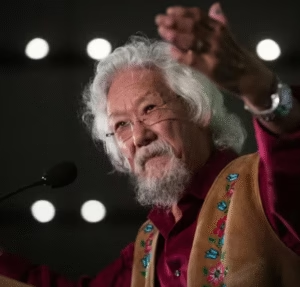 Climate change – is it past the point of no return or is it just a matter of degree?
Climate change – is it past the point of no return or is it just a matter of degree?
David Suzuki, long-time journalist and environmental activist, was interviewed by Stephen Quinn on CBC’s Early Edition on July 9th. Echoing a July 2nd interview he did with iPolitics, Suzuki was scathing in his indictment of those responsible for failing to take the necessary decisive action to dramatically reduce greenhouse gas emissions before we passed the point of no return.
We have now passed a number of significant milestones. The World Meteorological Organization (WMO) has confirmed that 2024 was the warmest year ever recorded, averaging about 1.55°C above pre-industrial levels. They note that the past ten years have been the ten warmest years on record.
Restricting the increase in global warming to less than 1.5°C has long been accepted by the United Nations and climate scientists in general as necessary to prevent environmental catastrophe. In fact, temperatures will almost certainly continue to rise, and it now looks likely that we will surpass the critical threshold of 2°C. This may not sound like a large increase, but the outcomes could be deadly.
Massive changes are already underway, as is clearly shown on the U.S. government’s Global Climate Dashboard. NASA also continues to track environmental vital signs, including continual rises in atmospheric carbon dioxide, global temperatures, atmospheric methane, and ocean warming, as well as the loss of ice sheets and rising ocean levels.
These triggers themselves will increase greenhouse gas emissions and thereby set in motion inescapable feedback loops. Once we cross the 2°C threshold, unimaginable amounts of methane gas will be released into the atmosphere causing global temperatures to rise even further. This in turn will result in more methane gas being released. As masses of ice in the Arctic and Antarctic melt away, less and less of the sun’s heat will be reflected back into the atmosphere and instead will be absorbed by the planet. This too will create a cataclysmic feedback loop – the more the ice melts, the warmer the Earth’s temperatures rise, which in turn melts more ice.
In speaking with Quinn, Suzuki delivered his ominous assessment in his typical no-nonsense style. There was no sugar coating in his grim prognosis. We are now too late to stop the inevitable.
He pointed out that understanding of the depth of the threat is not new. At the conclusion of a 1988 Toronto Conference on the Changing Atmosphere, a warning was issued that if climate change was left unchecked, “consequences could be second only to a global nuclear war.” He noted that if greenhouse gas emissions had been reduced then by 20% over 15 years, billions of dollars and countless lives would have been saved.
Instead, we did nothing.
In his interview with Quinn, and later when speaking with CBC News, Suzuki cited the work of Johan Rockström, Director of the Potsdam Institute for Climate Impact Research, who led the development of the Planetary Boundaries framework, which defines the limits in nine interrelated areas essential to keeping the planet stable and habitable. These areas are climate change, biodiversity loss, land use change, freshwater use, ocean acidification, ozone depletion, atmospheric aerosol loading, chemical pollution, and novel entities (such as plastic pollution).
Suzuki confirmed that we passed their seventh boundary this year. The Potsdam Institute’s Planetary Health Check has issued a red alert.
The day following his chat with Suzuki, Stephen Quinn interviewed Seth Klein, Team Lead and Director of Strategy at the Climate Emergency Unit. Seth had a very different message, that climate change is a matter of degree — as planetary temperatures increase, the negative effects will worsen but will worsen gradually.
Klein advanced the notion that climate change is a matter of degree because it’s not a question of whether it will or won’t happen, explaining that climate doesn’t work that way, but that each incremental increase in temperature will have an impact on that many more people and that many more places. He said it’s equally true that anything we do to prevent that increase will save more people and more places.
He stressed that not to prevent the increase is obscene, and that we are clearly not doing everything we can and should be doing.
There is a danger in Klein’s seemingly detached, almost theoretical approach to the climate issue which, among other faults, appears to treat lives as numbers only. People are losing their homes and communities, and they are dying. This is not an academic experiment.
Too many governments and politicians are already complacent about our clearly changing environment. Wildfires, superstorms, massive floods, and extreme heat, among other emergencies, are written off as unpredictable, when they have clearly become far too predictable and tragic. Explanations that are detached from personal realities just make it easier to avoid taking action.
David Suzuki says that Canadians are not scared enough. He is outraged and apoplectic, as we all should be. As Suzuki succinctly summed up to Stephen Quinn: “We’re digging our own grave and the first thing to do is to stop digging!”
We won’t solve the emergency by being detached. Emotions are appropriate.
Daily atmospheric CO2 [Courtesy of CO2.Earth]
Latest daily total (July 17, 2025): 428.42ppm
One year ago (July 16, 2024): 425.79ppm
I want to let you know that I won’t be sending out a blog next week as this weekend my partner Penny and I will be happily enjoying the Vancouver Folk Festival. For information, check out https://thefestival.bc.ca/#
Also, this month’s Fireside Movie Night Is next Friday! Our film this month is The Power of Big Oil. For more information and to register, go to https://us02web.zoom.us/meeting/register/Lf0p9ZXaTQGuU8D2h8MJsg#/registration
Subscribe to Tim Louis
Keep up to date Tim's latest posts.

Thank you Tim. You have been an inspiration for me my entire life.